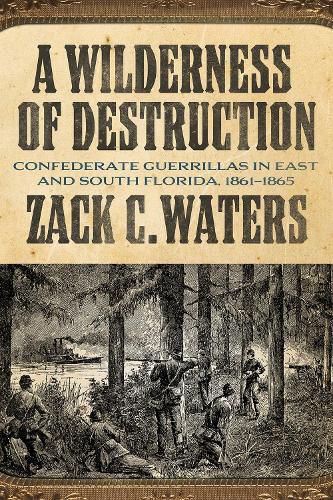Readings Newsletter
Become a Readings Member to make your shopping experience even easier.
Sign in or sign up for free!
You’re not far away from qualifying for FREE standard shipping within Australia
You’ve qualified for FREE standard shipping within Australia
The cart is loading…






Modern historians have consistently treated Florida as a military backwater. Despite that assessment, Rebel guerrillas blocked repeated Union attempts to establish a stronghold in the Florida's interior. After the ""abandonment"" of Florida by the Confederate government, in early 1862, Gov. John Milton organized guerrilla units to protect the state's citizens. These irregular companies kept Union forces largely confined to a few coastal outposts (St. Augustine, Fernandina, and Ft. Myers), though the state's citizens suffered greatly from the depredations of Unionist units. After the Federals capture of Vicksburg, the South's only significant source of beef were the vast herds in Florida. It fell to the state's Rebel partisans to protect the state's interior, thereby keeping open routes for the delivery of longhorns to the South's major armies. Skirmishes and battles raged throughout Florida, but the flow of beef cattle halted only after Appomattox. This book should be of interest to those researching the Civil War and Florida history. Also, local historians studying cities such as Tampa, Jacksonville, or more rural areas, will find a wealth of information in this volume.
$9.00 standard shipping within Australia
FREE standard shipping within Australia for orders over $100.00
Express & International shipping calculated at checkout
Modern historians have consistently treated Florida as a military backwater. Despite that assessment, Rebel guerrillas blocked repeated Union attempts to establish a stronghold in the Florida's interior. After the ""abandonment"" of Florida by the Confederate government, in early 1862, Gov. John Milton organized guerrilla units to protect the state's citizens. These irregular companies kept Union forces largely confined to a few coastal outposts (St. Augustine, Fernandina, and Ft. Myers), though the state's citizens suffered greatly from the depredations of Unionist units. After the Federals capture of Vicksburg, the South's only significant source of beef were the vast herds in Florida. It fell to the state's Rebel partisans to protect the state's interior, thereby keeping open routes for the delivery of longhorns to the South's major armies. Skirmishes and battles raged throughout Florida, but the flow of beef cattle halted only after Appomattox. This book should be of interest to those researching the Civil War and Florida history. Also, local historians studying cities such as Tampa, Jacksonville, or more rural areas, will find a wealth of information in this volume.